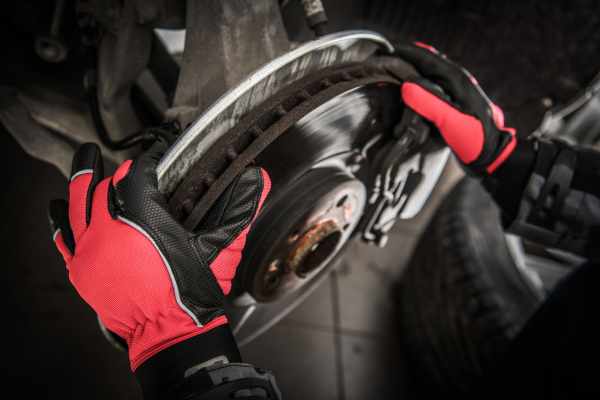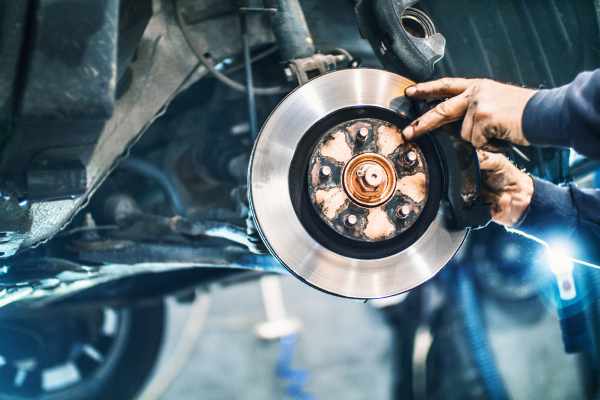Brakes are one of the most critical safety components of your vehicle, and their proper functioning is essential for safe driving. Recognizing the signs of brake problems early can help you address issues before they become more severe. In this blog, we will discuss common symptoms of brake problems and the importance of timely brake maintenance. Call our Oak Lawn brake repair shop at 708-907-5673 to schedule an appointment.
Unresponsive Brake Pedal
An unresponsive brake pedal, where you need to press harder or pump the brakes to slow down or stop, is a clear warning sign. This could be caused by air in the brake lines, brake pad wear, or a malfunctioning brake booster.
One of the key indicators of brake failure is an unresponsive pedal. When you press your foot on the brake pedal, it should easily engage and slow down or stop your vehicle. However, if you find that you need to apply more pressure than usual or pump the brakes to achieve the desired effect, it is important to address this issue promptly.
There are several potential causes for an unresponsive brake pedal. One possibility is that there may be air in the brake lines. Over time, air can enter the brake system through small leaks or when the brake fluid is low. This can lead to a spongy or unresponsive brake pedal. Another potential cause could be a worn-out brake master cylinder. The master cylinder is responsible for converting the pressure you apply on the brake pedal into hydraulic
Spongy Brake Pedal
If your brake pedal feels spongy or soft when you apply pressure, it may indicate air in the brake lines or brake fluid leakage. A spongy pedal can compromise your ability to brake effectively and should be addressed immediately.
A spongy brake pedal is one of the common signs that something is wrong with your vehicle's braking system. When you press down on the brake pedal, it should feel firm and responsive. If instead, it feels soft or spongy, it can be indicative of air in brake fluid lines or a leak.

Air can enter the brake lines through various means, such as when the brake fluid is low, when there is a leak in the system, or when the brake lines are damaged. When air enters the brake lines, it can cause various issues that indicate a brake problem. It is important to identify these signs promptly and address them to ensure safe driving.
Vibrating Steering Wheel while Braking
When you experience vibrations or shuddering in the steering wheel while applying the brakes, it could be due to warped brake rotors. Warped rotors can lead to uneven braking and decreased stopping power, posing a safety hazard.
A vibrating steering wheel while braking is one of the common signs indicating a potential brake problem in a vehicle. This issue can be quite alarming and should not be ignored, as it can compromise the safety and performance of the brakes.
When you press the brake pedal, your vehicle's braking system relies on various components working together to slow down or stop the vehicle. One crucial part of this system is the brake pads. Over time, the brake pads can wear out and may need to be replaced. It is important to be aware of the common signs of brake problems to prevent any potential accidents or damage to your vehicle.
Grinding or Squeaking Noises when Braking
Abnormal sounds such as grinding or squeaking noises when you apply the brakes can be an indication of worn brake pads. Ignoring these sounds can lead to further damage to the brake components, potentially resulting in costly repairs.
When you press the brake pedal, it is not uncommon to hear a slight squeak or grinding noise. However, if these noises become louder and more persistent, it could be a sign of a brake problem that needs immediate attention.
One common cause of grinding or squeaking noises when braking is worn brake pads. Brake pads are designed to wear down over time as they make contact with the brake rotor, creating friction to slow down and stop the vehicle. When the brake pads become worn, the metal piece serving as the backing plate can come into contact with the rotor, resulting in a squeaking or grinding sound.
Leaking Fluid
Brake fluid is crucial for hydraulic brake system operation. If you notice brake fluid leaks around the wheels or under the vehicle, it's a sign of a brake fluid leak. Loss of fluid can lead to complete brake failure, making it a severe safety concern.
Brake fluid plays a vital role in the functioning of a vehicle's hydraulic brake system. It is responsible for transmitting the force applied on the brake pedal to the brakes themselves, allowing for effective stopping power. Therefore, any signs of leaking fluid should not be taken lightly as they can indicate potential brake problems.
One of the common signs of a brake problem is observing brake fluid leaks around the wheels or under the car. Brake fluid is crucial for the proper functioning of the braking system, as it helps transmit force from the brake pedal to the brake pads and ultimately slows down or stops the vehicle. Therefore, any leakage of brake fluid can indicate a potential problem with the brakes.
One way to identify brake fluid leaks is by observing wet spots or puddles of fluid around the wheels or under the car after it has been parked for a while.
One common sign of brake problems is the presence of brake fluid leaks. Brake fluid is a vital component in the braking system as it helps facilitate the transfer of force from the brake pedal to the brakes, allowing the vehicle to slow down or come to a complete stop. Therefore, any leaks in the brake system can compromise its effectiveness and pose a serious safety hazard.
One of the most noticeable signs of a brake fluid leak is the presence of fluid puddles underneath the vehicle. These puddles may be clear or have a yellowish tint, indicating the presence of brake fluid. It is important to note that water or oil leaks can also create puddles, so it is essential to identify the specific type of fluid leaking.
Dashboard Warning Light
Many modern vehicles are equipped with a dashboard warning light that illuminates when there is a brake system issue. If the brake light indicator comes on, it's essential to have your brakes inspected immediately by a qualified mechanic.

The brake warning light on the dashboard is typically represented by a symbol that looks like an exclamation mark inside a circle, often accompanied by the word "BRAKE" or "ABS" (Anti-Lock Braking System). Your brake warning light serves as an important indicator of potential problems and should never be ignored.
The Importance of Regular Brake Maintenance
Regular brake inspection and maintenance is crucial for the safety and optimal performance of your vehicle. The braking system plays a vital role in ensuring that you can stop your vehicle promptly and efficiently whenever necessary. Failing to properly maintain your brakes can lead to serious consequences, including accidents, injuries, and expensive repairs.
One of the most important reasons for regular maintenance is to identify and address any potential problems before they escalate into major safety issues. Even the most well-maintained brakes will need something replaced and looking for common points of failure
What Happens When You Drive With Worn Brakes?
Driving with worn brakes can be extremely dangerous and can lead to serious accidents. It is crucial for every driver to be aware of the common signs of brake problems and take immediate action if any issues are detected.
Get Your Brakes Serviced at Dax Tires
Regular brake maintenance and timely detection of brake problems are essential for your safety and the longevity of your vehicle. If you notice any of these common signs of brake issues, don't hesitate to consult a professional mechanic. Addressing brake problems promptly ensures that your vehicle's braking system remains reliable and keeps you and others safe on the road. Call us to schedule a complete brake inspection with our Oak Lawn mechanics today.